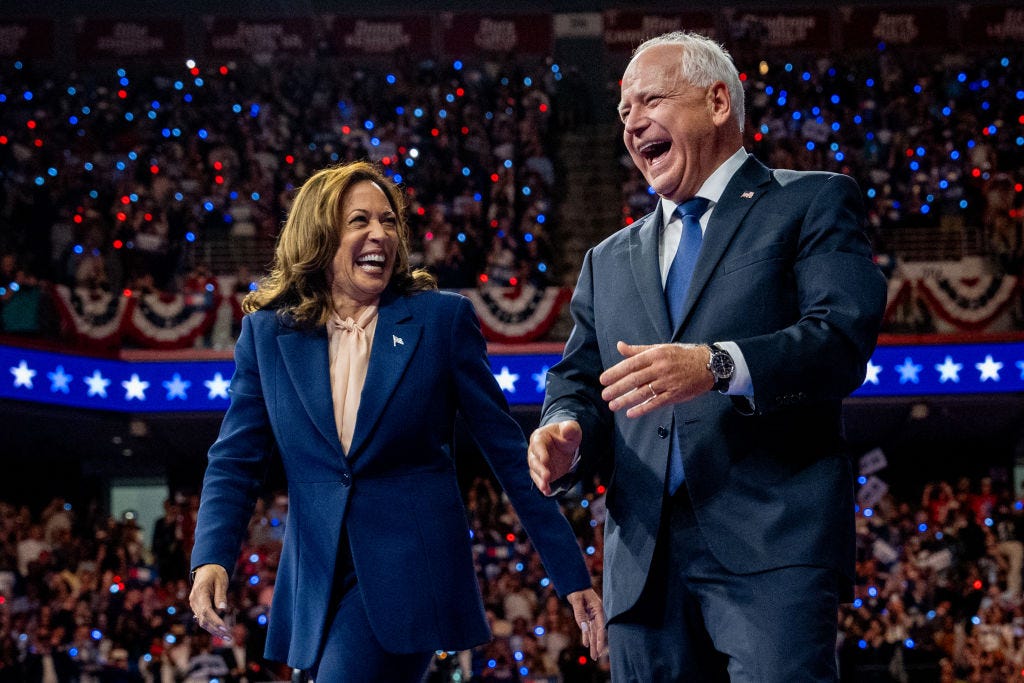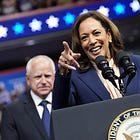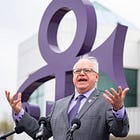What makes Tim Walz tick, trouble in teen treatment, hearing information out: Weekend reads for August 10, 2024
Some links worth your time this weekend
How can we keep up with the degree of head-spinning change that’s marked the Democratic presidential campaign? It may be just what the doctor ordered (and what we thought could animate the campaign), but it’s a lot to follow.
In this third week of the Harris candidacy, the “veepstakes” came to a close, ending a week of agita for all sectors of the Democratic constituency with a candidate — Tim Walz — who not only puts a lot of pragmatic elements together, but has the potential to shift the Party’s relationship with a demographic for whom it has consistently failed to develop a compelling vision: men. And indeed, the Harris-Walz campaign has continued to dominate the public conversation, while Republicans have struggled to mount a coherent attack on Walz.
Can Walz’s very different model of what it means to be a man joyfully bridging the gap between past and future provide the alternative to MAGA visions of masculinity? Does he point a way forward out of a mess we’ve been tracking all year — the difficulty of addressing the crisis of change management facing American men?
We’ve thought that through in this newsletter, and we’ve asked you about it, and In this week's readings — the links we pull together for our paid subscribers each weekend — we’ve dug into the question of what makes Walz such a compelling choice for the ticket. We’ve also got a collection of intriguing pieces on everything from traumatic abuses in the teen treatment industry (and what former Kentucky governor Matt Bevin and Paris Hilton have to do with it), to the role of social media disinformation in the riots plaguing England, to the ways scientists across multiple fields are using the full range of their senses to get a fuller understanding of experimental data.
A request for those who haven’t yet joined us: The interviews and essays that we share here take research and editing and much more. We work hard, and we are eager to bring on more writers, more voices. But we need your help to keep this going. Join us today to support the kind of independent media you want to exist.
In case you missed it
To kick off our Unburdened series, in which we talk to some of the smartest people we know about the biggest, boldest policies they’d like to see from a Harris-Walz administration, Debt Collective organizer and author Astra Taylor told us about her notion of an “Unburdenomics” that President Harris could embrace to truly fix the problem of student debt and create a freer economy.
I think it would be brilliant to reframe debt cancellation broadly as an issue of fairness, but also as an issue of freedom. To get into the weeds a little bit, Kamala Harris is not just running for president. She actually is the vice president right now. So to have the best chance of implementing a policy of unburdenomics, she actually needs to start now.
We talked to art historian Sarah Lewis about her new book, The Unseen Truth, which is about the upheaval in Americans’ understanding of race at the turn of 20th century and what that reveals about how art and photography have been used to train people not to see.
The photographs that are published create a spectacle for the American imagination. The most widely disseminated ones are taken by Matthew Brady, the most famous photographer of the 19th century. And he's documenting this spectacle that P.T. Barnum mounts to engage with the strangeness of the region and the contradiction at the heart of the racial project. That's really, truly irreconcilable, right?
And that contradiction is that there's no such thing as whiteness at all. He puts on stage an exemplar of so-called white racial purity. And she looks like Angela Davis.
Anand was on Morning Joe to talk about how Tim Walz — Coach Walz — embodies a concept of being a man in America that bridges new and old notions. He’s both dude and mensch, and that might point the way forward out of a Democratic crisis.
Walz, in short, is the kind of older white guy who might show lost and confused men — his friends and neighbors — that you can be a dude and a mensch. He can fight for people on an emotional level that competes with the MAGA message and can show them by example that there’s real joy for everyone in realizing a multiracial democracy in America.
With the veepstakes over, we dug into the question of why Walz matters — and it’s a lot deeper than “weird.” It’s about a whole concept of pluralism and how to build a bridge to the future for Americans who’ve had trouble seeing a path forward.
As a white guy for pluralism who personally knows and cares about white people and men who are not for that future, at least not now, he offers a reminder to Democrats of the need to be forceful in defense of pluralism and, simultaneously, magnanimous about the journey it will take some Americans to get there. For millions, he might be a bridge to somewhere.
With a couple of weeks of hindsight, we looked into just how transformative the Harris campaign had been — even in advance of the Walz nomination.
Over the past two weeks, the national political conversation has been utterly transformed as reenergized Democrats recognized that with Kamala Harris at the top of the ticket, the election had become a real contest once again.
Meanwhile, dismissed as weird and tarred by their association with the over-the-top authoritarianism of the Heritage Foundation’s Project 2025 planning document, Donald Trump and MAGA Republicans have, for the most part, struggled to get a word in since — something we haven’t seen since 2016.
Understanding Tim Walz
From Wellstone to Walz
One of Walz’s classmates was Mark Ritchie, who had recently worked on a national voter registration campaign. During that effort, he had witnessed what he calls “manipulation” and “denying people the right to vote” in states across the country and in Minnesota. That had propelled him to consider running for office and to attend the session, where he bonded with Walz. “We were both mad about where democracy was heading,” he says
The attendees were schooled in what was called the “Wellstone triangle”—the necessity of connecting three different activities: electoral organizing; grass-roots, issues-oriented organizing; and the formulation of public policy. “Paul had argued that there was an unfortunate disconnect between electoral politics and people who did community organizing,” Costain says. “People in electoral politics had disdain for grassroots organizing and people who did community organizing had cynicism for electoral politics. Paul’s view was that we can’t win without the three parts of the triangle.” [Mother Jones]







